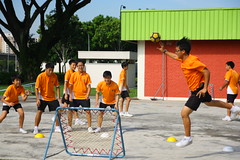Taking Play Seriously
15 May 2012

Professor Michael Chia advocates for daily self-directed play among youths as an important antidote to the pressures of a highly scheduled and sedentary lifestyle.
It takes just a minimum of 90 minutes every day, yet its compounded effects are profound on a child’s development. What is it? Believe it or not: play. “People think play is only for young children, but play evolves throughout a person’s lifetime,” says Professor Michael Chia, Professor of Paediatric Exercise Physiology at the National Institute of Education.
Through play, a child can develop greater creativity and resilience, increased problem-solving ability, and strengthened emotional, cognitive and physical strength. Prof Chia further asserts, “Through daily play, so much can be gained for so little investment.”
Prof Chia is the force behind the PRIDE for PLAY (PfP) initiative, which stands for “Personal Responsibility in Daily Effort for Participation in Lifetime Activity for Youth”. This is a whole-school project that sets aside 20 to 45 minutes everyday for free or organised play for all students in school, as well as before and after school. With the teachers playing alongside students, PfP sessions are an opportunity for students to learn in an authentic environment, as teachers can seize upon teachable moments that naturally occur.
Promoting life skills
“Children are learning, not just about the sport, but also about managing conflict and how to negotiate,” explains Prof Chia, emphasising how a daily dose of play enhances socio-emotional growth. “So it mirrors life’s training ground and develop in students the ability to get along with different people.” His work draws upon numerous research findings which show that EQ (a measure of emotional intelligence) is a stronger predictor of success and accomplishment than IQ (intellectual quotient).

Some schools such as Jurongville Secondary School have introduced 30 minutes of play as part of the school day.
PfP was launched four years ago, and schools such as River Valley Primary School and Jurongville Secondary School have already heeded the call. Some schools have taken two to five minutes from each of the timetabled periods for academic subjects and collectively pooled them for a PfP period. Taking away academic time and directing it towards play may seem counter-intuitive in a traditional school environment, yet schools have found that students’ readiness to learn in class is heightened after play because they would have expended some of their nervous energy. Prof Chia adds, “”The teachers informed me anecdotally that some parents had reported that their children became more helpful at home, volunteering to run errands or do household chores.”
Encouraging play at home
Indeed, Prof Chia hopes that to sustain the spirit and learning opportunities of the PfP sessions carried out in school, parents will also adopt it at home. Play can be a way to strengthen family bonds. “Little words, like ‘play’ and ‘love’, stand for the big things in life,” says Prof Chia. “Many adult recollections between themselves and their elderly parents are of times spent at the beach with parents, or of a parent teaching them how to ride a bicycle or playing a game of badminton together. Not of the time spent doing revision for examinations together!”
He continues, “Yet many parents do not play with their children. Parents are naturally over-concerned with their children’s academic performance and often overlook their physical or social and emotional development. Yet, play bonds children and parents and is the stuff that memories are made of.”
Prof Chia’s recommendations for more play time may strike a chord with parents who worry about their children’s inactive lifestyle and preference for sedentary pursuits such as technology-based entertainment. He shares some tips for parents who want to complement the schools’ efforts and recreate the PfP environment at home:
- Schedule play of 30 minutes’ duration at least three times a week, or daily for best results. Do a physical sport together such as badminton, chatek, throw and catch, and play outdoors if possible.
- Extend play time over the weekend and use it as an opportunity to get to know your children even better.
- Engage in safe play – use the right equipment which is in good condition. Ensure a safe environment (an open space, for example) and practise greater awareness of the body and its movements.
- Inculcate values during play, such as the importance of care and concern and the awareness that too much competition is bad for health and happiness, etc.
Prof Chia concludes, “You won’t be younger than today and your child will be older tomorrow – so practise PfP now. Make play a private family priority. Happiness together is making time for play.”
For further details on Prof Chia’s research, visit the Journal of Sports Science and Medicine website to read his academic paper, “PRIDE for PLAY: Personal Responsibility in Daily Effort for Participation in Lifetime Activity for Youth. A Singaporean Context” [PDF].


.jpg)
.jpg)

.jpg)
.jpg)